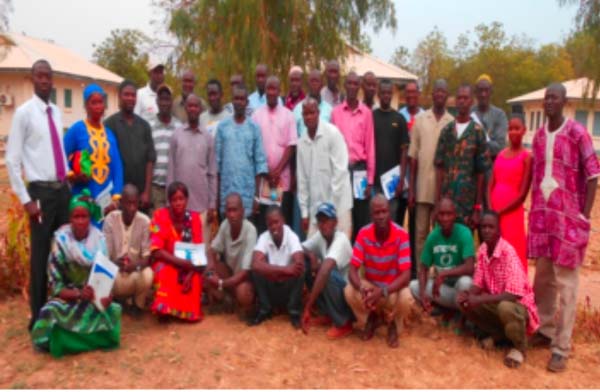
The deputy Governor in the Central River Region, CRR, recently presided over the official opening of an awareness-raising workshop for members of the regional Technical Advisory Committee (TAC), members of the Farmers Platform and other relevant stakeholders within CRR.
The objectives of any environmental education is to help people acquire basic understanding of how the environment functions, how people interact with it, how environmental issues and problems arise, and how they could be resolved, said CRR deputy Governor Camara.
At the Regional Education Office in Janjanburay where the ceremony was held, Malang Saibo Camara told the participants that the sensitization training exercise would help increase their awareness and sensitivity to the local environment and its problems, and the experience gained would help them acquire knowledge and skills in taking thoughtful and positive action toward the solution of our environmental problems.
He applauded the NEA/FFF/FAO for their foresight in bringing this very important capacity building activity to the doorsteps of their local stakeholders within the region, with the aim to expand and multiply the number of actors who are active in environmental protection and rehabilitation in all sectors and at all levels of society.
The NEA’s Director of Inter-Sectoral Network, Momodou Jaama Suwareh, said the ANR policy is the umbrella strategy that supports The Gambia’s national plans, processes and actions for the attainment of sustainable development in agriculture and natural resources.
He said the policies focus on improved and sustainable measurable levels of food and nutrition security in the country and the vulnerable populations, in particular.
The policy also catered for a strong and enabling environment, thus reducing vulnerability in food and nutrition security, and thereby creating a sustainable effective management of the natural resources base of the sector, Suwareh added.
“There are a considerable number of policies and legislation (laws and Acts) that deal with the environment, agriculture and natural resources management,” he said, adding that some of those policies, laws and Acts, include the Gambia Environmental Action Plan (GEAP), the Biodiversity and Wildlife Policy, the Fisheries Policy and Forest Policy.
He pointed out that the provincial regional capitals of Kerewan and Mansakonko in the North Bank and Lower River Regions respectively already hosted similar cross-learning dialogues, where all relevant stakeholders converged and synergized their experiences and strategized the way forward toward attainment of sustainable management of our agricultural and natural resources.
The programme officer for Agriculture and Natural Resources at the NEA, Lamin Camara, said this sector plays a pivotal part in any development agenda, for the fact that it is the base for any sustainable development initiative.
He said President Yahya Jammeh, in his capacity as the Chairman of the Gambia Environment Management Council (NEMC), has since 1994 been advocating for the massive development of the agricultural sector and the sustainable use of our scarce natural resources.
Camara added that the development of agriculture and natural resources is bound to make profound impacts on not only the lives of the inhabitants, but also help structure and protect the ecosystems - fauna, flora and the water bodies.
In a bid to mitigate the potentially irreparable environmental impacts of these actions, the NEA signed a letter of agreement with the Forest and Farm Facility (FFF) through the Food and Agriculture Organization (FAO) to implement small grant programmes to serve as a support to the agriculture and natural resource platform of The Gambia through support to government cross-sector coordination, he said.
The NEA programme officer further stated that it is from this backdrop that the NEA, in collaboration with the FFF with support from FAO, embarked on awareness-raising campaigns for key sectors of government institutions, regional technical advisory committees (TAC), NGOs and farmer-based organizations (FBOs) in the Central River Regions on relevant ANR sector policies, including biodiversity and wildlife, fisheries, forest policies and the National Environment Management Act (NEMA) 1994.
Sheikh Alkinky Sanyang, environmental education and communication officer at the NEA, described this information-sharing synergy for technicians and other stakeholders in the management of agriculture and our natural resources, as timely.
He said all hands must be on deck within the regions to preserve and protect the environment.
Read Other Articles In Article (Archive)




